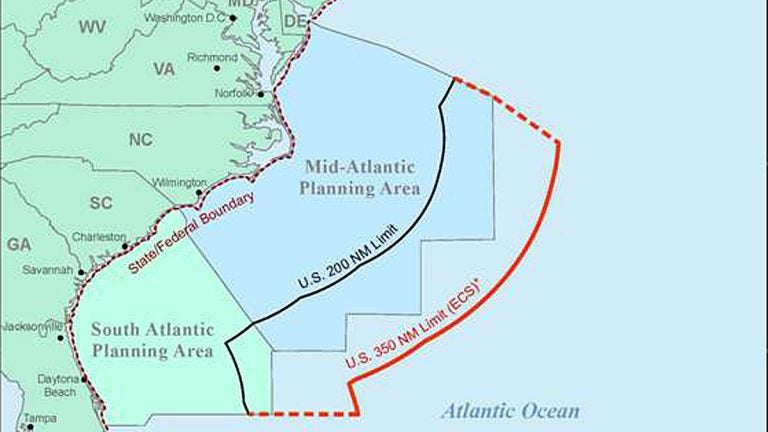U.S. to allow off-shore seismic testing for parts of the East Coast

Seismic testing is used to locate underwater gas and oil deposits.
The Obama administration has announced it will allow off-shore seismic testing to begin from the Delaware River Bay to Florida. Seismic testing is used to evaluate the potential for gas and oil exploration and is opposed by environmentalists, the New Jersey Department of Environmental Protection, and many Democratic lawmakers in Congress.
The latest announcement from Bureau of Ocean Energy Management came on Friday, a day typically used to go public with decisions likely to engender opposition. It is aimed at updating the 40-year-old data about offshore energy resources along the mid- and south Atlantic coast — from Delaware River Bay to just south of Cape Canaveral in Florida.
Previously, the federal government also approved another seismic-testing program off Barnegat Bay in New Jersey to be conducted sometime this summer, an action the state DEP tried to block in court but failed to do.
Foes oppose the seismic testing saying it could open the Atlantic Ocean to future oil and gas development. In addition, they argue that seismic testing could imperil marine mammal populations as well as important commercial fisheries.
Seismic testing involves using air guns on ships that release intense blasts of compressed air — almost as loud as explosives — into the water for weeks and months at a time, according to the Natural Resources Defense Council.
Before the testing could occur, companies would need to get permits from the Bureau of Ocean Energy Management, which issued the decision.
“Not only is seismic exploration a gateway drug to offshore drilling, it is a major assault on our ocean itself, with far-reaching impacts on marine mammals and fish,” said Michael Jasny, director of NRDC’s marine mammal protection project.
“Green-lighting seismic off the East Coast makes no sense for whales, for fisheries, for energy prices, or for children’s future in a warming climate,” he said. According to the NRDC, air-gun surveys also have been shown to dramatically depress catch rates of commercial species across thousands of acres of ocean.
The bureau, an arm of the U.S. Department of Interior, said its decision incorporates the highest level of safeguards to eliminate the impacts on marine life.
“The bureau’s decision reflects a carefully analyzed and balanced approach that will allow us to increase our understanding of potential offshore resources while protecting the human, marine and coastal environments,” said Walter Cruicksank, acting director of the agency.
For many years, however, the state and lawmakers, as well as past and current governors, have opposed any moves to permit gas and oil drilling off the Jersey coast, fearing it could adversely affect the state’s $40-billion-a year-tourism industry.
Previous explorations to drill for natural gas and oil in New Jersey have not proven economically feasible, but energy lobbyists say advanced drilling techniques could mine the fuels that could prove profitable.
“The use of these seismic cannons not only endangers the marine life off our coasts, but is a step towards opening up New Jersey’s coastal communities to the kind of catastrophic environmental damage that we have seen in the Gulf of Mexico,” said U.S. Sen. Robert Menendez (D-N.J.), who criticized the bureau’s decision.
Cassandra Ornell, a staff scientist for Clean Ocean Action, disputed the federal government’s claim that its approved plan establishes safeguards to reduce or eliminate the impact on marine life. “The only way to ensure that is to not do seismic testing at all,” she said.
Menendez agreed, describing the decision as another handout to Big Oil.
“At a time when these companies are raking in sky-high profits while they pollute our air and irreparably damage our marine ecosystems, we do not need to make it easier for them to expand their offshore drilling operations,” he said.
___________________________________
NJ Spotlight, an independent online news service on issues critical to New Jersey, makes its in-depth reporting available to NewsWorks.
WHYY is your source for fact-based, in-depth journalism and information. As a nonprofit organization, we rely on financial support from readers like you. Please give today.




